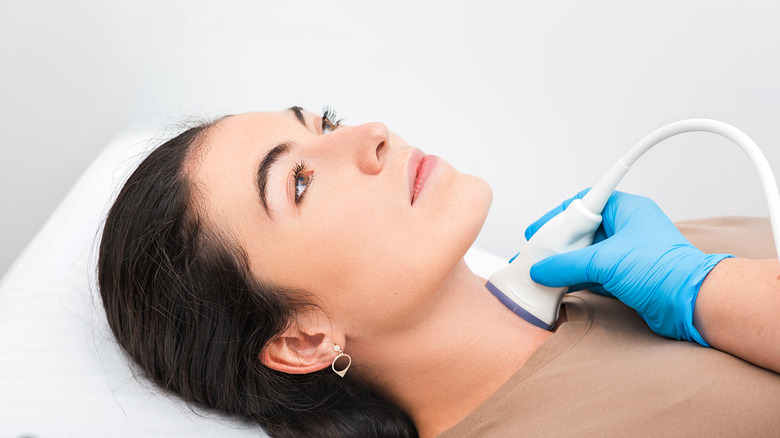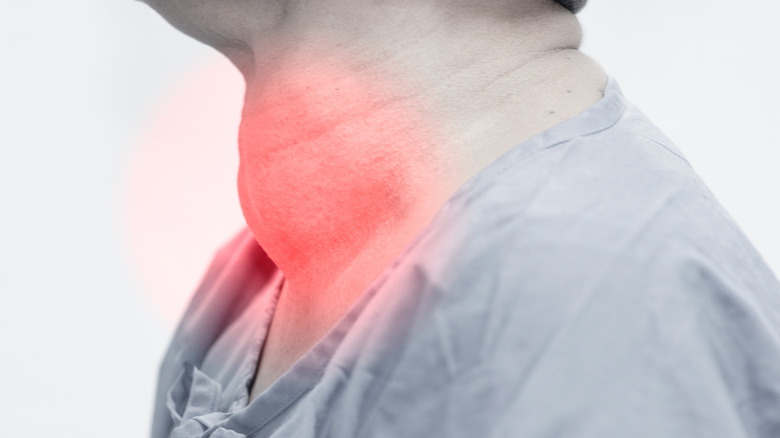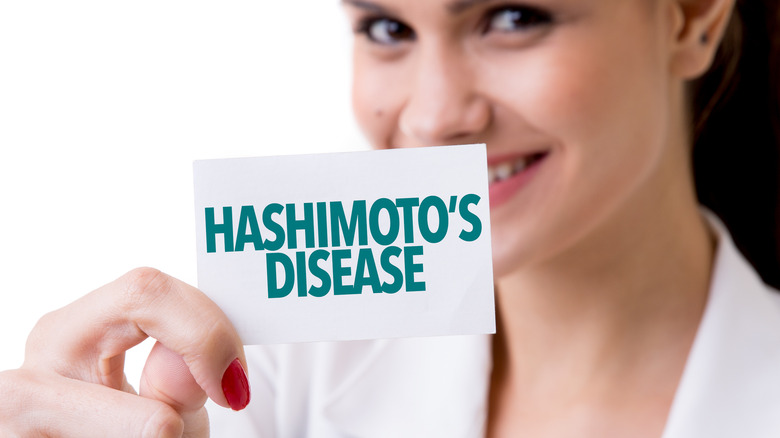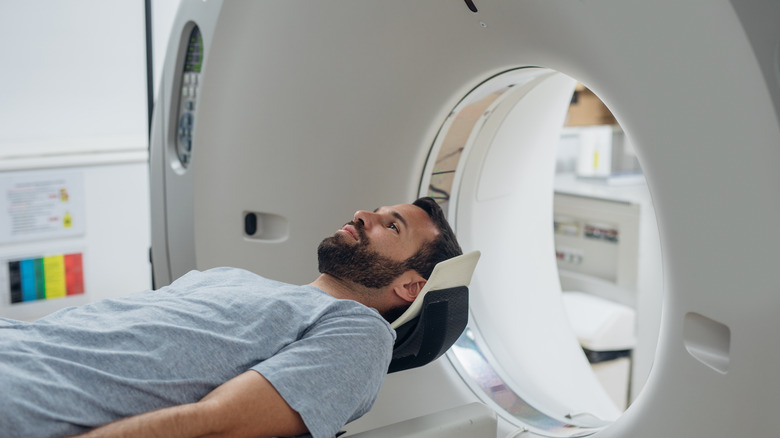Hyperthyroidism Explained: Causes, Symptoms, And Treatments
Your thyroid gland is responsible for secreting several hormones. This small butterfly-shaped gland that sits at the front of your neck impacts several functions of your body, including your metabolism and temperature regulation (via Thanc Guide). It also regulates brain development. Dr. Camilo Gonzalez-Velazquez explained in an article for Thanc Guide that the thyroid gland "produces, stores and circulates hormones throughout the bloodstream." She continued, writing, "The thyroid produces two main hormones: triiodothyronine (T3) and thyroxine (T4). The production of these two hormones is monitored and controlled by two glands in the brain, the hypothalamus and the pituitary. The pituitary gland releases thyroid stimulating hormones (TSH) in order to regulate the activity of the thyroid gland."
When too much thyroid hormone is produced it can cause issues in your body. This is called hyperthyroidism. According to Mayo Clinic, this happens when your thyroid overproduces thyroxine. This can lead to a whole host of unpleasant symptoms. Thankfully, with treatment, the impact of the symptoms can be lessened. Arming yourself with the right knowledge will help you manage the condition.
What causes hyperthyroidism?
There are various underlying conditions that could potentially cause hyperthyroidism. The most common cause is Graves' disease (via Healthline). Graves' disease is an autoimmune disorder found in both men and women but is usually seen more in the latter. In fact, it is up to eight times more likely to appear in women than men, and most are diagnosed between the ages of 40 and 60 (via Endocrine Web). The condition "causes antibodies to stimulate the thyroid to secrete too much hormone," Healthline explained.
There is potentially a genetic component to Graves' disease. If you're aware of family members who have been diagnosed with the disease, it may be worth mentioning it to your primary care physician. Knowing this history and depending on your physical examination, the doctor may run a blood test to confirm whether you may have the disease.
Healthline highlighted some other potential causes of hyperthyroidism, including excess iodine, large amounts of tetraiodothyronine that are found in dietary supplements or medications, thyroiditis (also called inflammation of the thyroid), ovarian or testes tumors, and benign (noncancerous) tumors on either the pituitary gland or thyroid.
What is Graves' disease?
"A lot of people get scared when they first hear the name [Graves' disease]," Dr. Caroline Messer, an endocrinologist at Lenox Hill Hospital in New York City, told Endocrine Web. Its name may make some individuals do a double-take, but the prognosis is generally favorable for those who are diagnosed with Graves. The key is getting diagnosed early. Advanced Graves' disease can cause complications like goiter, skin thickening, or thyroid eye disease. Endocrine Web reported that thyroid eye disease occurs in 30% of those diagnosed with Graves'. This complication causes red eyes, sensitivity to light, and the feeling that something is in your eye.
A more severe complication of Graves' disease is called a thyroid storm. Although rare, it can happen if the thyroid remains unchecked for a prolonged period of time. It causes agitation, high body temperature and blood pressure, restlessness, confusion, and rapid heart rate.
Graves' disease is listed as the number one cause for hyperthyroidism. It is seven to eight times more likely to appear in women than men and the peak ages for diagnosis are between 40 and 60.
The risk factors of hyperthyroidism
According to the American Thyroid Association, 20 million Americans have thyroid disease, yet 12 million of this population may be unaware that they're at risk for overactive or underactive thyroid. Endocrinologist Maria Papaleontiou told the University of Michigan Health that thyroid issues are more prevalent than even heart disease or diabetes.
Do certain risk factors predispose certain individuals to hyperthyroidism? According to Dr. Papaleontiou, yes. These risk factors include an iodine issue; a family history of thyroid disease radiation treatment in your head, neck, or chest; being over 60 years old; recent pregnancy; and eating large amounts of food that contain iodine or taking medications containing iodine. Autoimmune disorders can also be a risk factor for hyperthyroidism.
"The good news is that once a thyroid condition is identified, it can be successfully treated and patients can resume a healthy lifestyle without restrictions," said Dr. Papaleontiou.
Symptoms of hyperthyroidism
Hyperthyroidism or overactive thyroid has many symptoms. The symptoms that people experience when having thyroid issues usually affect the whole body, according to the Cleveland Clinic. Some of the symptoms are weight loss, increased appetite, rapid heartbeat, feeling shaky or on edge, diarrhea or more frequent bowel movements, menstrual changes, temperature intolerance, sweating, or swelling of the thyroid gland. You could also experience vision loss, double vision, or bulging or redness in the eyes. You may not experience all of these symptoms; rather, you may have a few key issues that indicate a thyroid problem. Some also experience a rapid heartbeat. You should not ignore this symptom, in particular, as it could result in a stroke.
Pay close attention to all of your symptoms, especially if they are interfering with your day-to-day activities. Don't wait to call the doctor; watching to see if something worse happens is not the best strategy when approaching your health.
It's possible not to have any symptoms of hyperthyroidism
Hyperthyroidism doesn't always present with recognizable symptoms. You may not have a rapid heartbeat or weight loss, but that doesn't mean your thyroid is functioning normally. Dr. Alejandra Borensztein, a physician at Penn Endocrinology Cherry Hill, told Penn Medicine, "Sometimes, patients notice or feel a bump on their neck, or sometimes their doctor detects a lump during a physical exam." If no other symptoms are present, it might be hard to detect an issue.
"Thyroid nodules are often found incidentally during neck imaging for other conditions and are picked up in CT scans or MRIs," explained Dr. Borensztein. It's important for individuals to schedule their physicals annually since it is easy to assume that if you aren't having any symptoms, nothing is wrong. You cannot necessarily self-check your thyroid to determine if there is a mass. Make it a habit to schedule your annual physical at the same time of the year so it becomes something you do automatically.
What's the difference between hyperthyroidism and hypothyroidism?
Hyperthyroidism is the release of too much thyroid, while hypothyroidism indicates low thyroid. Hypothyroidism may make you feel tired. You may also gain weight and be unable to regulate your temperature. One of the most serious complications of hypothyroidism is myxedema, or severely low thyroid. This can cause anemia, heart failure, confusion, low body temperature, and even coma, according to the Cleveland Clinic. Inflammation of the thyroid, surgical removal of the gland, and iodine deficiency are causes of hypothyroidism. Hashimoto's disease is also a common cause of hypothyroidism and there is a genetic component involved in that it is usually passed down within a family. The disease causes damage to the thyroid gland.
Most people will recognize that hypothyroidism and hyperthyroidism cause opposite symptoms. With hyperthyroidism comes a tendency to feel nervous. You may also lose weight without trying to do so. According to the Mayo Clinic, thyrotoxic crisis is one of the more severe complications of hyperthyroidism. This is defined as a "sudden intensification of your symptoms, leading to a fever, a rapid pulse and even delirium," and it requires immediate medical attention.
How is hyperthyroidism diagnosed?
Diagnosing hyperthyroidism early is crucial. Your primary care physician can make that determination. Be honest about the symptoms you experience and let the physician know if you are experiencing new ailments from week to week. The doctor will likely conduct a physical exam and ask you questions about how you are feeling.
To diagnose your condition, your doctor will conduct blood tests, according to Verywell Health. The specific blood tests involved include thyroid stimulating hormone (TSH) test, along with thyroxine (T4) and triiodothyronine (T3) tests. Generally, the battery of blood tests includes all three, since testing for one won't give the doctor a clear indication of thyroid health. Along with the blood tests, a doctor will measure your heart rate and blood pressure as well as palpate your thyroid to see if there are any discernable lumps. If lumps are detected, imaging may be ordered. Imaging often includes an ultrasound, CT scan, MRI, or a radioactive iodine test.
Doctors can treat hyperthyroidism with medication
Individuals can take medications to successfully treat hyperthyroidism. One medication, radioactive iodine, has worked well for patients for decades. Ingesting radioactive iodine can lead to your thyroid shrinking, according to WebMD. But is it safe? Thankfully, yes. About 70% of all adults are treated with radioactive iodine, WebMD confirmed.
In addition to radioactive iodine, doctors may prescribe methimazole and propylthiouracil to block the release of too much thyroid. These medications may provide relief within three months, although you may have to continue treatment longer to prevent relapse. It make take up to six months for radioactive iodine to work and there is a possibility that taking this drug may cause you to have hypothyroidism.
Another prescribed medication is beta-blockers. This medication will not necessarily target the production of thyroid hormone, but it will help to lessen some of your symptoms. Some common side effects of beta blockers include headache, dizziness and digestive issues.
Do you need surgery for hyperthyroidism?
For an overactive thyroid, trying less invasive measures, like taking medications, is usually recommended. Surgery is not usually the best course of action. However, if you're unable to take beta-blockers or thyroid-blocking medications, it may help to have an invasive procedure. A thorough analysis of the risks and benefits should be considered.
According to WebMD, your doctor may recommend a surgery called a thyroidectomy, which means your entire thyroid will be removed. The surgery doesn't come without its risks. There is a possibility that your parathyroid could accidentally be removed and that means you will have to take calcium supplements. Also, there is a possibility that vocal cords might become damaged. With thyroid removal, you will have to take lifelong medication to keep the gland stable. It's advisable to get a second opinion if surgery is recommended. You should also exhaust non-invasive methods before having your thyroid completely removed.
What to eat if you have hyperthyroidism
Citing the American Thyroid Association, people with high thyroid should avoid iodine. This means you should avoid seafood, dairy, large amounts of poultry, beef, grain products, egg yolks, and iodized salt. Some herbal supplements also have iodine, so be sure to check the label.
On the other hand, some foods can help reduce the symptoms of hyperthyroidism. Cruciferous vegetables, like cauliflower, kale, and cabbage, are great choices. Broccoli may be especially helpful. "Broccoli is part of the goitrogen family — foods that can decrease the amount of thyroid hormone the thyroid gland produces," Endocrine Web revealed. Additionally, strawberries, blackberries, and blueberries contain several antioxidants that can help boost general health.
Since a long-term risk of hyperthyroidism is brittle bones, it can be beneficial to both manage your condition and consume more dairy. Have the extra bite of cheese or add a little extra milk to your coffee. Individuals might also consider eating salmon, as the vitamin D it contains "works with calcium to prevent bone loss," according to Endocrine Web.
Exercises to help with hyperthyroidism
If you have thyroid disease, your goal is likely to manage your symptoms with medications and lifestyle changes, like exercise. There are several benefits of exercise for individuals with hyperthyroidism. We're talking better sleep, improved heart health, and the prevention of bone loss (via Verywell Health). If you resist exercise, consider scheduling it on your calendar, using music or podcasts to accompany your workout, get an accountability partner, or make it a family endeavor with everyone getting in on the action. It might be hard to continue to stay motivated, but try varying up your strategies to make exercise a part of your lifestyle.
Those who don't like high-impact movements can consider biking, walking, and using an elliptical. Verywell Health suggests the exercises that focus on low-impact movement can help keep your body moving in a manageable way.
Note: You should monitor your heart rate when you first begin any type of exercise because hyperthyroidism tends to increase heart rate, thus placing strain on your heart. Consult with a doctor before exercising, especially if you've been sedentary and you're trying these movements for the first time.
Don't discount yoga for hyperthyroidism
Yes, yoga can be beneficial for those with hyperthyroidism. Focus on restorative poses, since these stances can help with the anxiety that often accompanies the condition (via Medical News Today). However, you may want to avoid some poses, like the cobra, headstand, and boat pose, as they may stimulate the thyroid and are thus better suited for people with hypothyroidism.
Beginners may want to try a supported shoulder stand, which helps the neck and throat area. Doing the fish pose can help stretch the body in the opposite direction and is recommended after a supported shoulder stand. Before you begin a yoga practice, make certain you clear it with your doctor. Begin the practice gradually and tailor your yoga poses around your thyroid levels. And as Medical News Today cautioned, "It is important to remember that yoga is a complementary therapy. It can be undertaken alongside other treatments recommended by a doctor, but cannot replace them."
Managing hyperthyroidism long term
Generally, hyperthyroidism progresses slowly, according to Everyday Health. Once you've received the diagnosis, you will likely have to check your thyroid levels regularly. These blood tests help to determine if the medications or treatments you are using are working to regulate your thyroid. Doctors like to measure levels periodically because in some instances "treating hyperthyroidism can lead to hypothyroidism," according to Western New York Urology Associates.
It is wise to keep a journal of your symptoms, especially if they are not similar to what you've experienced before with your thyroid disease. Regular medical checkups, managing stress levels, exercising, and paying attention to your diet can also help alleviate any of the symptoms you feel with hyperthyroidism. The key is paying attention to your body and making certain that you're addressing the condition.
Unchecked hyperthyroidism can lead to serious complications including death (via Everyday Health). Nevertheless, hyperthyroidism is very manageable.














